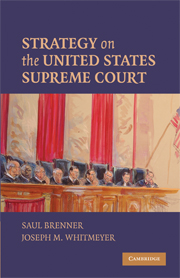Book contents
- Frontmatter
- Contents
- Preface
- PART I INTRODUCTION
- 1 The Legal Model
- 2 The Attitudinal Model
- 3 The Strategic Models
- PART II CERTIORARI
- PART III THE CONFERENCE VOTE ON THE MERITS
- PART IV THE MAJORITY OPINION AND OTHER OPINIONS
- PART V THE FINAL VOTE ON THE MERITS
- PART VI CONCLUDING CHAPTERS
- Appendix 1 Decision Making on the United States Supreme Court
- Appendix 2 Additional Questions to Explore
- References
- Table of Cases
- Index
2 - The Attitudinal Model
Published online by Cambridge University Press: 05 June 2012
- Frontmatter
- Contents
- Preface
- PART I INTRODUCTION
- 1 The Legal Model
- 2 The Attitudinal Model
- 3 The Strategic Models
- PART II CERTIORARI
- PART III THE CONFERENCE VOTE ON THE MERITS
- PART IV THE MAJORITY OPINION AND OTHER OPINIONS
- PART V THE FINAL VOTE ON THE MERITS
- PART VI CONCLUDING CHAPTERS
- Appendix 1 Decision Making on the United States Supreme Court
- Appendix 2 Additional Questions to Explore
- References
- Table of Cases
- Index
Summary
In reaction to the weaknesses of the legal model, Pritchett (1948) proposed an attitudinal model. This model was the dominant model for explaining the final vote on the merits from the 1950s until the end of the 1990s. Some scholars (Segal and Spaeth, 2002) believe that it is still the dominant model for explaining this vote. It is widely accepted among Supreme Court scholars (or at least among most political scientists) that the attitudes of the justices are the most important determinants of why some justices confronted with the same set of cases vote for the liberal outcome, whereas other justices vote for the conservative outcome. Baum (2007, p. 149), for example, concluded that
Of all the considerations that could influence the Supreme Court decisions [at the final vote on the merits], I have given primary emphasis to the justices' policy preferences. The application of the law to the Court's cases is usually ambiguous, and constraints from the Court's environment are generally weak. As a result, the justices have considerable freedom to take positions that accord with their own conceptions of good policy.
Segal and Spaeth (2002) present an even more elaborate explanation of why the justices can be expected to cast sincere, attitudinal votes at the final vote on the merits.
- Type
- Chapter
- Information
- Strategy on the United States Supreme Court , pp. 11 - 18Publisher: Cambridge University PressPrint publication year: 2009



